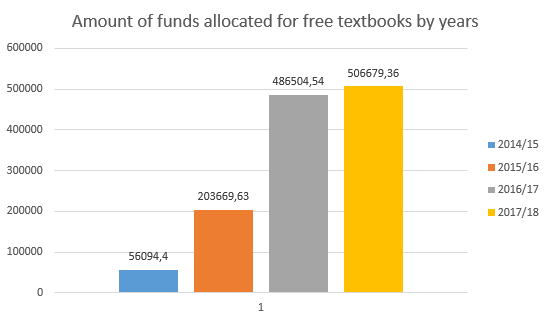Centre for Civic Education (CCE) has been monitoring for years the manner in which local self-governments allocate free textbooks for elementary school pupils. That practice used to be rather uneven, but in the last two years some progress was noticed.
The CCE addressed all local selfgovernments, total of 23 in Montenegro, requesting data if they provided free textbooks for pupils of elementary schools within their respective municipalities, for which grades and how much funds was allocated from the municipality’s budget for the school year 2017/2018, which was recently finished.
All municipalities approved access to information requested by the CCE, although the procedure lasted long, as not all of theme were equally prompt. Out of 23 municipalities, 19 submitted data on the number of allocated sets of textbooks, while 4 municipalities did not allocate funds for this purpose.
In 19 municipalities for school 2017/2018, 11 695 textbook sets were distributed, for which 506,679.36 EUR were spent. As per submitted data, among four municipalities that did not allocate funds for school year 2017/2018 were municipalities of Plav, Pljevlja and Rožaje, which until now have never provided free textbooks, while municipality of Savnik only provided funds for six textbook sets in school year 2016/2017. Individually, most of the funds of all municipalities in the school year 2017/2018 was allocated by Budva, which for the first time provided free textbooks for all its elementary school pupils, namely 2736 of them and spent for that purpose 182,698.70 EUR. Municipality of Podgorica follows with textbooks sets provided for 2593 pupils, and allocation of 112,772.00 EUR, while Berane is ranked third allocating 50,000 EUR for 951 pupils. However, municipalities of Berane, Budva and Pluzine are the only municipalities that provided textbooks for pupils of all grades.
As a reminder, in 2014 only three municipalities in Montenegro provided part of free textbooks – Berane, Plužine and the Capital City of Podgorica. Later on, in 2015, the number of municipalities that allocated funds for part of the free textbooks rose to seven. Sudden growth is recorded in the year of parliamentary elections and several local elections – 2016, when most municipalities, or more precisely 18, allocate funds for part of the school textbooks set. This trend continued in 2017, when 19 municipalities did so, out of which during the period, i.e. the school year 2017/2018 to which the funds refer, 12 municipalities had local elections.
Despite many appeals from the CCE throughout the years, there is still no willingness of decision-makers to find a sustainable solution to cover the total cost of primary education in order for it to be de facto free. There is a tendency of increase of providing free textbooks sets, but still considerable majority is not on equal footing – more precisely 58,425 pupils. This number is far from respecting the mandatory constitutional norm which prescribes right to education under equal conditions, and compulsory and free elementary education.
According to the data available at Monstat website, in 2016/17, total of 68,409 pupils attended elementary school in Montenegro, out of which 893 children with special needs. We believe that this is an approximate number for 2017/18, since there are no published systematised data. The cost of school material for all pupils can be very burdensome for home budget, as this does not include just textbooks, but also school materials, notebooks, etc. This specifically refers to families in which there are more children in elementary schools. The price of elementary school textbook sets last year ranged from 50 to 90 EUR, depending on the grade.
It should also be stressed that certain funds in elementary schools were provided in the form of donations, as it was the case in Kotor, where the donation of PR China secured funds for free textbooks. Also, in the municipalities of Andrijevica and Cetinje, free textbooks were partly funded by private companies. These are positive examples that other municipalities could apply to facilate fundrasing for local budgets.
The CCE appreciates the efforts of those municipalities which continually provide funds for free textbooks, but appeals that it does not depend on socio-political circumstances, and recommends that all municipalities should follow the example of Berane, Budva and Pluzine which have established the practice of providing textbooks for all grades of primary school.
The CCE will continue to monitor the manner of provision of free books for Montenegrin pupils.
Mira Popović, programme associate

